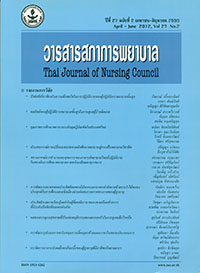คุณภาพการศึกษาพยาบาลระดับดุษฎีบัณฑิตในประเทศไทย
Keywords:
คุณภาพการศึกษาพยาบาล, การศึกษาพยาบาลระดับปริญญาเอก, quality of Thailand’s, Ph D level nursing educationAbstract
บทคัดย่อ
ประเทศไทยยังไม่เคยมีการประเมินคุณภาพการศึกษาพยาบาลระดับปริญญาเอก ในภาพรวมอย่างเป็นระบบ นอกเหนือจากการประเมินคุณภาพการศึกษาตามเกณฑ์ของประเทศ และสถาบันโดยกลไกประกันคุณภาพการศึกษา สถาบันส่วนใหญ่ประเมินคุณภาพหลักสูตรของ ตนเองเมื่อนักศึกษาสำเร็จการศึกษาทั้งกระบวนการและผลลัพธ์ การวิจัยแบบสำรวจนี้มีวัตถุประสงค์ เพื่อศึกษาคุณภาพการศึกษาพยาบาลระดับปริญญาเอกในประเทศไทย ประชากรที่ใช้ในการวิจัย ได้แก่ คณบดีหรือประธานหลักสูตรปริญญาเอก อาจารย์ผู้สอนในหลักสูตรปริญญาเอก นักศึกษา ปริญญาเอกที่ผ่านการเรียนมาแล้ว 3 ภาคเรียน และดุษฎีบัณฑิตที่สำเร็จการศึกษาไม่เกิน 3 ปี จากคณะพยาบาลศาสตร์ที่มีหลักสูตรปริญญาเอก 7 แห่ง จำนวน 392 คน การเก็บรวบรวมข้อมูล โดยใช้แบบสอบถามออนไลน์ ประกอบด้วย 1) แบบสอบถามความคิดเห็นของคณบดีหรือ ประธานหลักสูตรปริญญาเอกต่อหลักสูตรปริญญาเอก 2) แบบสอบถามความคิดเห็นของอาจารย์ ต่อคุณภาพด้านหลักสูตร ด้านอาจารย์ ด้านแหล่งสนับสนุนการเรียนการสอน และ ด้านการ ประเมินหลักสูตร และ 3) แบบสอบถามความคิดเห็นของนักศึกษาและดุษฎีบัณฑิตต่อคุณภาพ ด้านหลักสูตร ด้านอาจารย์ ด้านแหล่งสนับสนุนการเรียนการสอน และ ด้านการประเมินหลักสูตร ผลการวิจัยพบว่ามีผู้ตอบแบบสอบถามจำนวน 199 คน อาจารย์ นักศึกษา และดุษฎีบัณฑิต มากกว่าร้อยละ 80 ประเมินคุณภาพการศึกษาระดับปริญญาเอก ตลอดจนสิ่งแวดล้อมทางวิชาการ ที่เอื้อต่อการศึกษาระดับปริญญาเอกในสถาบันการศึกษาของตนเอง อยู่ในระดับดี และประเมิน ว่าได้รับประโยชน์จากสิ่งแวดล้อมทางวิชาการที่เอื้อต่อการศึกษาในระดับปริญญาเอกในระดับมาก เมื่อพิจารณาคุณภาพการศึกษาพยาบาลระดับปริญญาเอกทั้ง 4 ด้านได้แก่ ด้านหลักสูตร อาจารย์ ผู้สอน แหล่งสนับสนุนการเรียนการสอน และการประเมินหลักสูตร มากกว่าร้อยละ 80 เห็นด้วย กับคุณภาพการพยาบาลระดับปริญญาเอกในสถาบันตนเองตามตัวชี้วัดของแต่ละด้าน และประเมิน คุณภาพรายด้านอยู่ในระดับดี เช่นเดียวกัน ผลการวิจัยครั้งนี้สามารถนำไปเป็นแนวทางในการพัฒนาคุณภาพการจัดการศึกษาพยาบาล ระดับปริญญาเอกในสถาบันการศึกษาพยาบาลให้ดีหรือดียิ่งขึ้นและเป็นไปตามมาตรฐานสากล ต่อไป
คำสำคัญ : คุณภาพการศึกษาพยาบาล, การศึกษาพยาบาลระดับปริญญาเอก
Abstract
Thailand has thus far never imposed a methodically and holistically organised evaluation system on its nursing education. Apart from the nationally required assessment, most institutions employ institution-specific quality assurance evaluation methods to measure the efficiency of their curricula, viz. the process, and the competency of their graduates, viz. the product.
The main objective of this survey research project was to study the quality of Thailand’s Ph D level nursing education. The sample population consisted of Ph D faculties’ deans or Ph D programmes’ chairpersons, Ph D programmes’ faculty members, Ph D students having completed at least 3 semesters and Ph D graduates having completed their studies for no more than 3 years. All of the members of the population, totalling 392, were from 7 faculties of nursing that offered Ph D programmes. Data were collected by means of an on-line questionnaire, which comprised 1) a survey form eliciting opinions of Ph D faculties’ deans or Ph D programmes’ chairpersons regarding the Ph D programmes; 2) a survey form eliciting opinions of Ph D programmes’ faculty members regarding the quality of the curricula, faculty members, learning facilities and curricular assessment methods; and 3) a survey form eliciting opinions of Ph D students and graduates regarding the quality of the curricula, faculty members, learning facilities and curricular assessment methods.
The research produced the following results. In total, 199 of the sample subjects responded to the questionnaire. More than 80 percent of the faculty members, students and graduates considered their Ph D programmes and supporting academic environment and facilities to be ‘good’; they, in addition, considered such supporting academic environment and facilities to be ‘highly’ conducive to their Ph D pursuits. In the light of the four aspects of Ph D in nursing education, namely, the quality of the curricula, faculty members, learning facilities and curricular assessment methods, more than 80 percent of the respondents were satisfied with the quality of their programmes as shown by each index, and considered the respective aspects of their programmes to be ‘good’.
These results could be applied to the development of Ph D in nursing education. Subsequently, they could lead to further attempts to standardise nursing programmes to meet international requirements.
Keywords : quality of Thailand’s, Ph D level nursing education








